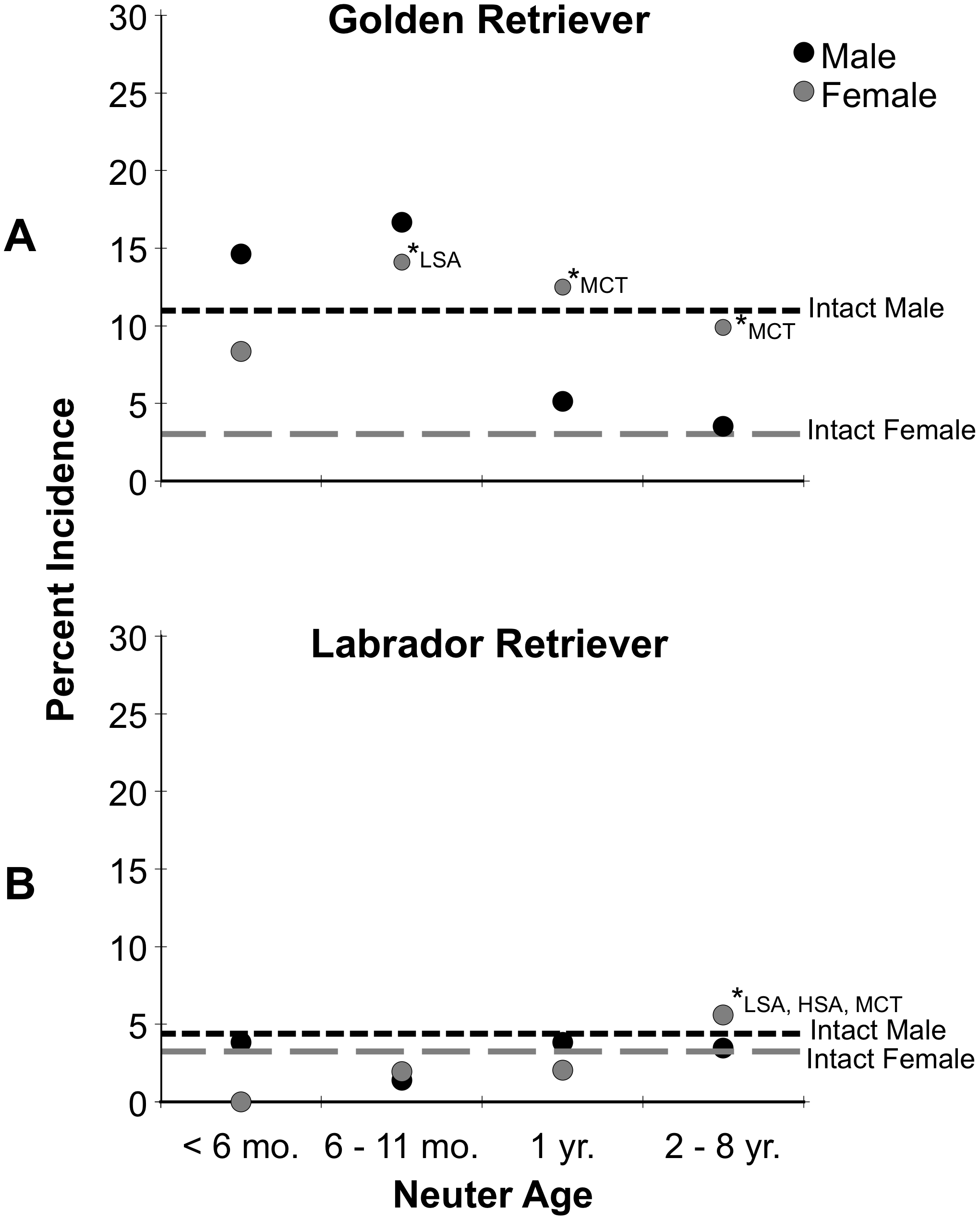Are you wondering at what age to neuter your golden retriever? Well, you’ve come to the right place! Neutering is an important decision that can have several benefits for your furry friend, so it’s essential to know when it’s the right time. In this article, we’ll discuss the optimal age for neutering a golden retriever and why it’s a good idea for their overall health and well-being!
So, let’s dive right in! Golden retrievers are known for their friendly and energetic nature, but when it comes to deciding when to neuter them, there isn’t a one-size-fits-all answer. However, most experts recommend neutering male golden retrievers between the ages of six and nine months. By this time, they have usually reached a level of physical and sexual maturity that makes the procedure safe and effective.
Now, you might be wondering why it’s important to get your golden retriever neutered at the right age. Well, neutering not only helps reduce the risk of certain health issues, such as testicular and prostate problems, but it also helps control their behavior. Neutering can help prevent unwanted behaviors like excessive marking, aggression, and roaming. Plus, it can also reduce the chances of your golden retriever developing certain types of cancer later in life.
So, there you have it! Neutering your golden retriever at the right age can have numerous benefits for their health and behavior. Remember to consult with your veterinarian, as they can provide personalized advice based on your dog’s individual needs. By making an informed decision, you’ll be helping your furry friend lead a happy and healthy life!

The Ideal Age to Neuter a Golden Retriever: What You Need to Know
Golden Retrievers are a popular breed known for their friendly and gentle nature. Neutering is a common procedure for many dog owners, but determining the best age to neuter your Golden Retriever can be a crucial decision. In this article, we will explore the factors to consider and provide insights into when to neuter your furry friend.
The Health Benefits of Neutering
Neutering your Golden Retriever offers numerous health benefits that can contribute to their overall well-being. Here are some advantages of the procedure:
1. Preventing Unwanted Litters
One important reason to neuter your Golden Retriever is to prevent unplanned and unwanted litters. By neutering your dog, you eliminate the risk of accidental pregnancies and reduce the number of stray dogs. This not only promotes responsible pet ownership but also contributes to controlling the pet population.
Additionally, neutering can help prevent certain reproductive health issues in both male and female Golden Retrievers. In females, it eliminates the risk of developing uterine infections, ovarian cysts, and mammary tumors, while in males, it reduces the chances of testicular cancer and certain prostate diseases.
2. Behavioral Benefits
Neutering can have positive effects on your Golden Retriever’s behavior. Male dogs that are neutered tend to exhibit reduced aggression and territorial marking behaviors. They are also less likely to roam or try to escape in search of potential mates. Neutering can help prevent instances of aggression towards other dogs and reduce the frequency of urine marking in your home.
In female Golden Retrievers, spaying eliminates the heat cycle, which can be accompanied by changes in behavior, including restlessness, mood swings, and increased vocalization. By avoiding the heat cycle, you can maintain a calmer and more stable temperament in your furry companion.
3. Health Risks of Late Neutering
While the decision of when to neuter your Golden Retriever is ultimately yours, it is generally recommended to perform the procedure before your dog reaches sexual maturity. Waiting too long to neuter your dog may increase the risks of certain health conditions.
For female Golden Retrievers, the risk of developing mammary tumors significantly increases after their first heat cycle, which usually occurs around six to nine months of age. Early spaying, performed before the first heat cycle, can greatly reduce this risk. On the other hand, delaying the procedure increases the likelihood of developing mammary tumors, making it crucial to consider spaying at an appropriate age.
4. Finding the Balance: Growth and Longevity
One factor to consider when deciding the ideal age to neuter your Golden Retriever is the balance between growth and longevity. Neutering too early, before your dog has fully matured, may impact their growth rate and even lead to potential bone and joint issues later in life.
On the other hand, waiting too long to neuter your Golden Retriever, especially in large breeds like the Golden Retriever, may increase the risk of certain health conditions such as cancer and urinary disorders. Striking the right balance is crucial to ensure the well-being and longevity of your furry friend.
When is the Best Time to Neuter a Golden Retriever?
Now that we understand the benefits and considerations of neutering, let’s delve into the details of when to neuter your Golden Retriever.
1. Early Neutering – 6 to 9 Months
For most Golden Retrievers, the recommended age for neutering falls within the range of 6 to 9 months. During this period, your dog is approaching sexual maturity, and neutering can help prevent unwanted behaviors and health issues. However, make sure to consult with your veterinarian as individual factors such as size, growth rate, and overall health may influence the ideal timing.
Early neutering provides the most significant benefits in terms of preventing reproductive health issues and reducing certain behavior problems. By neutering your Golden Retriever before sexual maturity, you increase the chances of having a well-adjusted and healthy companion.
2. Late Neutering – Over 1 Year
If you choose to delay neutering your Golden Retriever, it is generally advisable to wait until they have completed their growth and reached at least one year of age. By allowing your dog to fully mature before performing the procedure, you minimize the potential risks associated with early neutering, such as growth plate disruptions or orthopedic problems.
However, keep in mind that delaying neutering into adulthood may increase the chances of certain health conditions, such as mammary tumors in females or testicular cancer in males. Regular check-ups with your veterinarian are essential to monitor your dog’s health and discuss the best timing for the procedure.
3. Individual Considerations
It’s important to remember that every Golden Retriever is unique, and there is no one-size-fits-all approach to determining the ideal age for neutering. Individual factors such as size, overall health, and behavior should be taken into account when making this decision.
Consulting with your veterinarian is crucial to assess your Golden Retriever’s specific needs and risks. Together, you can determine the best timing for the procedure, taking into consideration the potential benefits and health implications for your furry companion.
Key Takeaways: What Age to Neuter a Golden Retriever?
- Golden Retrievers can be neutered between 6 to 9 months of age.
- Neutering at a younger age may reduce the risk of certain health issues.
- Early neutering can help prevent unwanted behaviors like marking and aggression.
- It’s important to consult with your veterinarian to determine the best age for your specific dog.
- Neutering older dogs is still possible, but may require additional considerations.
Frequently Asked Questions
When it comes to neutering your golden retriever, there are many important factors to consider. From the right age to the potential benefits, here are some common questions answered.
1. What is the ideal age to neuter a golden retriever?
The ideal age to neuter a golden retriever is typically between six and nine months. This age range ensures that your pup is old enough for the procedure, yet young enough to prevent unwanted behaviors associated with maturity. However, it’s always best to consult with your veterinarian, who will consider your dog’s specific needs and development.
Neutering earlier, such as at four to six months, is also an option, but it may be associated with a higher risk of certain health issues, such as orthopedic problems. Additionally, late neutering, after the age of one year, may not provide as many behavioral benefits. Discussing the procedure with your vet will help you make an informed decision based on your golden retriever’s individual circumstances.
2. What are the benefits of neutering a golden retriever?
Neutering offers several benefits for golden retrievers. One of the main advantages is a reduced risk of certain cancers, such as testicular and mammary tumors. Neutering also helps prevent unwanted behavioral issues commonly associated with intact male dogs, such as aggression and marking territory.
Another advantage of neutering is the prevention of unwanted litters. By neutering your golden retriever, you contribute to the control of pet overpopulation and help reduce the number of homeless dogs. It can also make training easier, as neutered dogs are often more focused and less likely to be distracted by reproductive urges.
3. Does neutering a golden retriever affect their behavior?
Neutering can have an impact on a golden retriever’s behavior, but the effects differ from dog to dog. Generally, neutering can help reduce aggressive tendencies and diminish territorial marking behavior. It can also potentially reduce roaming and mounting behaviors associated with intact males.
However, it’s important to note that neutering alone may not entirely eliminate behavioral issues. Proper training and socialization play key roles in shaping a golden retriever’s behavior. It’s always beneficial to consult with a professional dog trainer or behaviorist to address any specific behavioral concerns you may have.
4. Are there any risks involved in neutering a golden retriever?
While neutering is a common procedure, it does carry some risks, like any surgical intervention. Potential risks include adverse reactions to anesthesia, infection at the surgical site, or postoperative complications. However, these risks are generally low and can be minimized by choosing a skilled and experienced veterinarian.
It’s crucial to follow your vet’s pre- and post-operative instructions, such as fasting your golden retriever prior to surgery, restricting activity during the recovery period, and keeping the incision site clean. By taking these precautions and closely monitoring your dog’s progress, you can help ensure a smooth recovery.
5. Will neutering my golden retriever affect their weight or metabolism?
Neutering can cause a decrease in a dog’s metabolism and potentially lead to weight gain if their diet and exercise routine are not adjusted accordingly. This is because neutering alters hormone levels, which can affect a dog’s appetite and metabolism.
To prevent excessive weight gain, it’s important to monitor your golden retriever’s diet and provide regular exercise. Feeding a balanced and appropriate amount of food, avoiding excessive treats, and engaging in daily physical activity will help keep your golden retriever at a healthy weight and minimize the risk of obesity-related health issues.

Don’t Spay and Neuter Your Dog?
Summary
If you have a Golden Retriever, you might wonder when to neuter them. Neutering before 6 months can have health benefits like preventing certain cancers and infections. However, waiting until after 6 months can be better for their bone growth and joint health. It’s important to talk to your vet about timing and consider your pup’s individual needs.
When you decide to neuter your Golden Retriever, it’s a big decision that can impact their health and development. Neutering before 6 months can be good for preventing health issues, but waiting until after can be better for their bones. Remember, always discuss with your vet to make the best choice for your furry friend.
